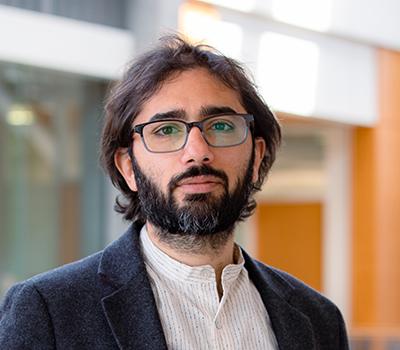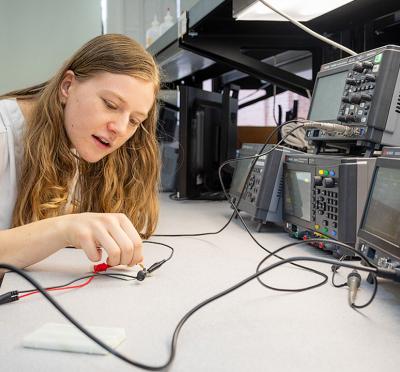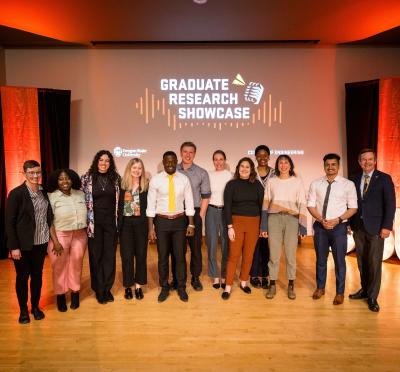Houssam Abbas (right) works with students on building a one-tenth scale autonomous race car in the College of Engineering at Oregon State University. Photo by Hannah O'Leary.
As the world becomes more dependent on the safe operation of autonomous vehicles and medical devices, the research in testing such systems becomes more critical. The challenge of developing control and verification algorithms for such safety-critical systems is what excites Houssam Abbas about his work.
And although his research begins with theory, it is more than that.
“There is more impact to research results if you demonstrate that the algorithms actually run in the real world,” said Abbas, an assistant professor of electrical and computer engineering who joined Oregon State in January 2019.
His techniques are already being applied by car companies for testing engines, and he is working on applications such as autonomous vehicles and implantable defibrillators. One advantage of being at Oregon State is the proximity to Intel Corp., where he is collaborating on a project to look at which security attacks on autonomous systems could lead to safety risks and how to mitigate those risks.
“Having a connection to industry is very helpful for guiding research because the companies have the problems and we help provide the solutions,” said Abbas, who previously worked for Intel for eight years. “We also have the freedom to look further down the road and tell industry and regulators what is likely to be the next problem.”
To test his algorithms, Abbas often uses a scaled-down system such as the F1/10, a one-tenth-scale autonomous race car that he helped develop at the University of Pennsylvania. He also uses the miniature race cars as a teaching tool. As students build the models in his class, they learn lessons about perception, planning, and control.
“It's one thing to hear the lessons in a lecture. It's another to actually build a system, see it fail, see it crash, fix it, build it again, and repeat that several times,” he said.
Abbas has a bigger vision for the impact of the miniature cars beyond his own research and teaching. He is helping to lead an effort that will put the F1/10s into the hands of researchers nationwide. It is a collaborative effort with the University of Pennsylvania and Clemson University, supported by a $1.5 million grant from the National Science Foundation.
“If you want to see these autonomous systems developed with high performance and a high guarantee of safety and security, then you need everybody to pitch in,” Abbas said. “And so we are going to help that process. It’s really about being part of a larger community.”
Testing autonomous systems on full-scale vehicles can be prohibitively expensive. A base model can cost over $300,000. Abbas says he priced one out at $700,000, loaded with everything he would need for his research. In contrast, the one-tenth sized cars will be free to the more than 30 labs collaborating on the grant. The smaller cars are also safer to use when testing out new systems.
Over the next three years, Abbas will be working with Rahul Mangharam, the lead principal investigator and associate professor at the University of Pennsylvania, and Venkat Krovi, Michelin Endowed Chair of Vehicle Automation at Clemson University, to develop a fleet of about 80 F1/10 cars; a simulator for autonomous driving supporting multiple cars, environments, and configurations; a comprehensive manual; a community Q&A site; lecture notes and videos for a course based on the F1/10 car; and a demonstration kit for community-building events.
Researchers receiving cars will contribute code and add to the design and documentation. The main product of the grant project is not the cars themselves (which will be donated to high schools and other groups at the end of the grant period), but the infrastructure that allows researchers to buy parts, download code and documentation, and build their own research or teaching platforms.
“The objective is to enable and catalyze research on autonomous systems for research groups that normally would not have the means, the resources, or the skills to build an autonomous car,” Abbas said.




